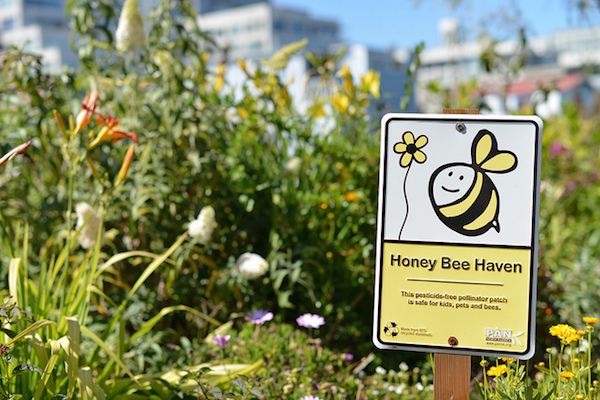
It’s difficult having a heart that wants to rescue the world.
When we, with our big hearts and tender souls, walk the earth, we often feel the ache of having too much to do and too little time and resources available to truly make a difference.
In this year of activism and social change, resistance fatigue can set in hard. It can make us shy away from taking on more causes. We’re tired, and starting to feel like the task before us is overwhelming. With all of this going on, and the need for human rights warriors to step up, saving the honeybees may not seem like a top priority.
But it is important, and we are not tasked with doing it alone.
There are easy steps—baby steps, if you will—that we can take to do our part in saving the honeybees, so that they can go about the business of pollinating our crops and supporting our ecosystem:
1. We can avoid picking or spraying pesticides on dandelions.
Instead of seeing them as a useless weed, we can remember that bees favor these bright flowers. By allowing them to grow or even planting them, we can offer the honeybees another food source to sustain them.
2. Plant flowers for bees.
Plant a garden that includes wild lilac, hyacinth, bee balm, Echinacea, daisies, hosta, zinnias, and asters (among others).
3. Sign up to receive 500 wildflower seeds from Cheerios to help save the honeybees.
Cheerios has removed their trademark bee (Buzz) from their boxes of cereal to help raise awareness for the plight of honeybees. For a limited time, they’re offering free wildflower seeds on their website to encourage planting flowers that will help sustain the bees. The #BringBacktheBees campaign is available while supplies last. To further support the campaign, consider purchasing a box of Cheerios to thank the company for their work with saving the bees.
4. If you see a swarm of bees in your neighborhood, call a local beekeeper or beekeeping association.
Please don’t spray pesticides or call an exterminator. Bees swarm when they’re selecting a new queen, and a beekeeper can help them find a new home.
5. Don’t use pesticides on your lawn or garden.
The bees could take these harmful chemicals back to their hive.
6. Encourage beekeeping by buying local honey that comes from hives that have not been treated with chemicals.
When you buy local honey, you help out a beekeeper and also benefit from the naturally wonderful properties of honey. Honey can be used to help treat coughs, or can be used as ingredients in a homemade facial.
7. Use a water feature or bird bath around your home to help thirsty bees out.
If you don’t have the space, even setting out a small container of water can be helpful—perhaps centrally located near the wildflowers you’ve planted.
8. Research all of the wonderful ways you can use honey and work them into your life.
Educating yourself on honey and the plight of honeybees is a simple step you can take to help save them.
9. Take a class on beekeeping.
We can start our own backyard apiary (place to keep bees) or simply learn about the process to better support local beekeeping efforts.
10. If a bee (not a wasp) lands on you, don’t swat at it.
If we’re still, the bee will most likely go on its way. Also, be careful not to block the entrance to hives or threaten the hive in any way. Honeybees will die if they sting you, and most are simply trying to catch your scent and mean no harm.
Trying to save the Earth is daunting, and it can feel like there are more causes than we have the time, energy, or resources to address them. We need to remember that we are not solely responsible for saving the Earth, but our smallest actions do have repercussions.
If we take small, positive steps that help the bees, we’re a part of saving them. We don’t have to make grand, expensive, extravagant, time-consuming gestures.
We only need to take the small steps to know that we’re contributing to a global effort to save the bees.
~
Author: Crystal Jackson

No comments:
Post a Comment